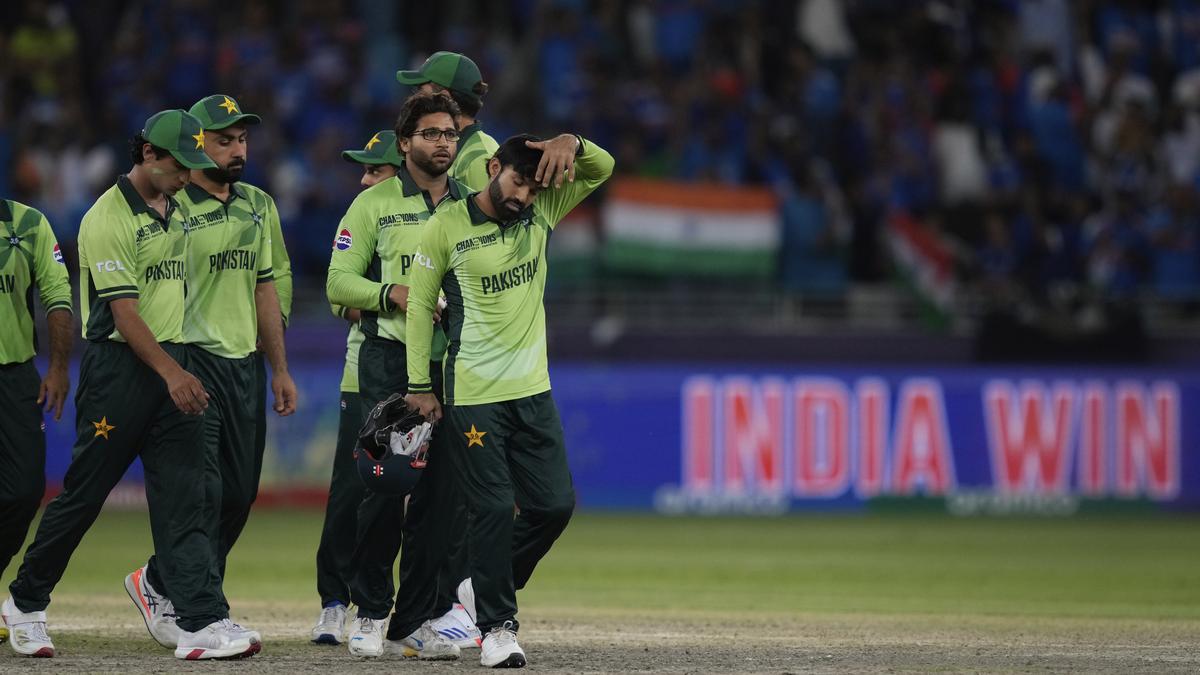Pakistan paid the price for fielding mistakes and a rather timid batting show.
| Photo Credit: AP
The stage was set perfectly for Pakistan. The country was hosting its first ICC tournament since the 1996 World Cup and was the defending champion. Yet, six days into the event, Mohammad Rizwan’s men’s campaign came to a shuddering halt.
While injuries to Saim Ayub (in the lead-up) and Fakhar Zaman (in the first match) weakened the line-up, those were not the only reasons for the early exit.
The losses to New Zealand and India had a predictable pattern as the batters’ timid approach proved costly. Chasing 321 against the Kiwis, the home side crawled to 22 for two in the PowerPlay and could never recover.
Despite a better start against the Men in Blue, the team got bogged down in the middle. Trying to accelerate, Pakistan lost wickets in clusters and finished with a modest total. The Men in Green’s dot-ball percentage was more than 50 (162 and 152 dot balls, respectively), and they couldn’t compensate with boundaries.
The squad lacks batting depth, and barring players like Salman Ali Agha and Fakhar, the others don’t have the ability to go big. The selection calls, too, defied logic. The decision to draft in Imam-ul-Haq, not part of the original contingent, instead of Usman Khan for the India match reflected the muddled thinking. The latter, who is in the 15, is yet to make his ODI debut.
The chatter ahead of the must-win game against its neighbour veered around how the team had always conjured up something special in a do-or-die situation, the halcyon days of the 1990s a glowing example. The comparison is tenuous, considering the depth of the current squad and also projected the mindset of a country stuck in a time warp.
Over the last decade, England has refashioned the way ODI cricket is played; the others, including India, have learnt from and adapted it to their style. Unfortunately, Pakistan has failed to change or progress with time, a fear of failure gripping the players. Even Rizwan acknowledged that his men lacked courage.
More worryingly, the outfit has also been left behind in areas like fitness and fielding. This was evident during Pakistan’s practice session two days before the high-profile contest. The session lacked the intensity one typically witnesses when giants such as India, England, and Australia prepare. Dropping catches during training is not a big deal, but missing simple chances means trouble.
On Sunday, Shubman Gill and Shreyas Iyer were beneficiaries of clumsy fielding efforts as they were put down early in their innings and made the ‘host’ pay.
Since its 2017 Champions Trophy triumph, Pakistan has not qualified for the knockout stages of a major ODI competition (2019, 2023 World Cup, and 2025 Champions Trophy). Only a complete overhaul of the system and a bold new approach can redeem the former world champion.
Published – February 26, 2025 08:42 am IST
